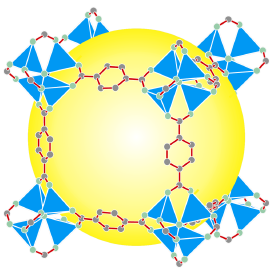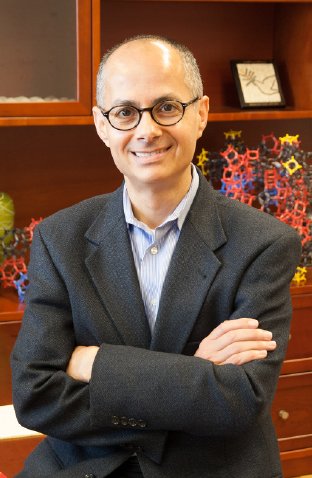Professor Omar Yaghi
Kolthoff Lecture #1
Professor Omar Yaghi
Department of Chemistry
University of California, Berkeley
Host: Professor Theresa Reineke
Reticular Chemistry of Metal-Organic Frameworks
Linking of molecular building blocks by strong bonds into crystalline extended structures (reticular chemistry) has resulted in metal-organic frameworks and made available precisely designed infinite 2D and 3D materials. The challenges and solutions to making crystalline, permanently porous frameworks, and the ‘grammar’ of linking organic and inorganic building blocks by strong bonds will be described. The resulting structures encompass space within which molecules can be further manipulated and controlled, leading to excellent catalysts, carbon capture and conversion to fuels, and in general, new conceptual advances in carrying out covalent chemistry beyond molecules.

Research
Professor Omar Yaghi's work encompasses the synthesis, structure and properties of inorganic and organic compounds and the design and construction of new crystalline materials. He is widely known for pioneering several extensive classes of new materials termed metal-organic frameworks, covalent organic frameworks, and zeolitic imidazolate frameworks. These materials have the highest surface areas known to date, making them useful in clean energy storage and generation. Specifically, applications of his materials are found in the storage and separation of hydrogen, methane, and carbon dioxide, and in clean water production and delivery, supercapacitor devices, proton and electron conductive systems. The building block approach he developed has led to an exponential growth in the creation of new materials having a diversity and multiplicity previously unknown in chemistry. He termed this field 'Reticular Chemistry' and defines it as stitching molecular building blocks into extended structures by strong bonds.
Professor Yaghi
Professor Yaghi received his Bachelor of Science degree from State University of New York-Albany, and doctorate from the University of Illinois-Urbana. He was a National Science Foundation Post-doctoral fellow at Harvard University. He has been on the faculties of Arizona State University, University of Michigan, and UCLA. He is currently the James and Neeltje Tretter Chair Professor of Chemistry at the University of California, Berkeley, and a senior faculty scientist at Lawrence Berkeley National Laboratory. He is the founding director of the Berkeley Global Science Institute. He is also co-director of the Kavli Energy NanoScience Institute, and the California Research Alliance by BASF.
Kolthoff Lectureship in Chemistry
Izaak Maurits Kolthoff was born on February 11, 1894, in Almelo, Holland. He died on March 4, 1993, in St. Paul, Minnesota. In 1911, he entered the University of Utrecht, Holland. He published his first paper on acid titrations in 1915. On the basis of his world-renowned reputation, he was invited to join the faculty of the University of Minnesota’s Department of Chemistry in 1927. By the time of his retirement from the University in 1962, he had published approximately 800 papers. He continued to publish approximately 150 more papers until his health failed. His research, covering approximately a dozen areas of chemistry, was recognized by many medals and memberships in learned societies throughout the world, including the National Academy of Sciences and the Nichols Medal of the American Chemical Society. Best known to the general public is his work on synthetic rubber. During World War II, the government established a comprehensive research program at major industrial companies and several universities, including Minnesota. Kolthoff quickly assembled a large research group and made major contributions to the program. Many of Kolthoff’s graduate students went on to successful careers in industry and academic life and, in turn, trained many more. In 1982, it was estimated that approximately 1,100 Ph.D. holders could trace their scientific roots to Kolthoff. When the American Chemical Society inaugurated an award for excellence in 1983, he was the first recipient.
